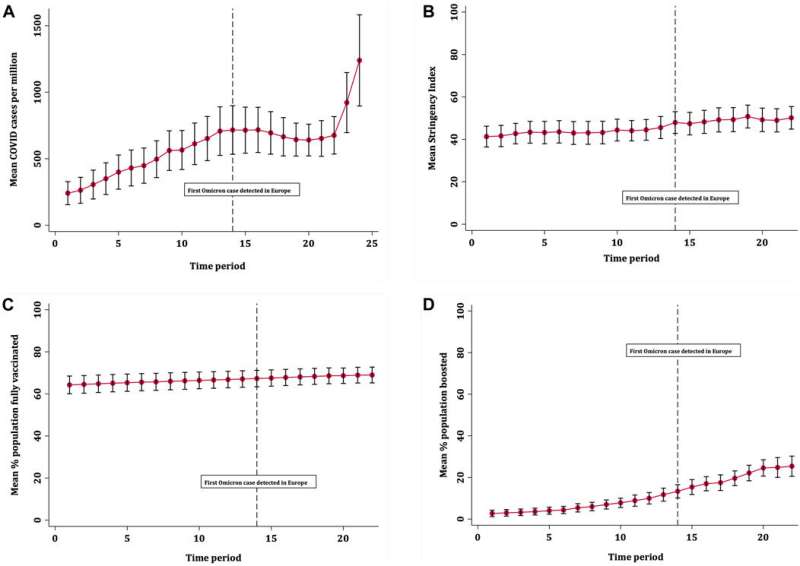
A small increase in the number of people having two vaccines against COVID-19 was more effective in controlling the virus during Europe’s fourth wave—when the omicron variant appeared—than the rapid uptake of booster vaccines, finds a new UCL-led study.
Published in the International Journal of Public Health, the study found that a 4.2% increase in the number of people having two doses (full vaccination) led to a 54% reduction in case rates across Europe—despite the detection of the highly infectious omicron.
Meanwhile, although average booster vaccination rates for the elderly and vulnerable increased from 2.71% to 24.5% it was found to provide no significant additional benefit for preventing COVID-19 cases.
Researchers say the findings highlight why full vaccination is vital to controlling the spread of COVID-19. Although vaccines may become less effective over time they still prevent some cases, and in doing so, help to buy time to scale-up other defense measures in the critical few weeks after new variants arrive. With only 20% of people in low-income countries fully vaccinated, scientists are urging governments and authorities globally to step up a policy of full vaccination for all.
Lead author Dr. Vageesh Jain (UCL Institute for Global Health) said, “While COVID-19 has become less severe, assisted by the availability of vaccines (including boosters), novel variants like omicron means disease control becomes an increasingly important objective.”
“It is therefore vital we prioritize full vaccination in those countries currently under vaccinated. This will help limit the widespread economic and social impacts of illness and isolation, reduce the chance of future more harmful COVID-19 variants developing, and help to mitigate long-term health impacts, including long COVID.”
Researchers used a longitudinal fixed effects Poisson regression model to assess the impact of vaccination on COVID-19 case rates across 32 countries in Europe from 13th October 2021 to 1st January 2022.
Europe’s fourth wave started in mid-October 2021 and by early November, Europe was once again “at the epicenter” of the pandemic, according to the World Health Organization (WHO). This was attributed to a combination of insufficient vaccine uptake and a relaxation of public health measures.
At the end of November 2021, omicron had also been reported in the region and by 16th December the variant had been reported in all but three European countries—with case rates jumping from 240 per million at the start of the study period to 1,239 per million by the end.
During this time, European countries increased their public health restrictions, for example by implementing travel constraints.
However, restrictions were also found to have little impact on controlling the virus, as case rates fell by just 2% for every one-point increase in Stringency Index*.
It should be noted that most European countries did not ban public events, close schools or businesses, or institute widespread lockdowns. The analysis was therefore not able to capture the impact of severe public health restrictions.
Dr. Jain added, “Vaccines are thought to be effective in preventing severe illness with COVID-19 but less effective in preventing symptomatic disease with the omicron variant.”
“We looked at whether increases in vaccination coverage had a significant impact on COVID-19 control in Europe in Winter 2021, and what the relative importance of two doses vs booster vaccination was.”
“The results found that a small increase in full vaccination coverage prevented many COVID-19 cases over the last few months of 2021, across Europe. This protective effect decreased over time but remained significant up to five weeks after the omicron variant was first detected in Europe.”
“Meanwhile, booster vaccine coverage increased quickly but did not provide significant additional benefit for disease control. And although the severity of public health restrictions increased slightly, it only had a small impact on COVID-19 case rates.”
Study limitations
Researchers used COVID-19 case rates as their outcome measure and so cannot draw concrete conclusions about the real-world impact of vaccines on the omicron variant specifically.
There may also have been some time and country-variant confounders that could not be adjusted for, such as compliance with facemask wearing. However, by including the severity of public health restrictions, the researchers hope to capture these effects at least partially.
There may also have been mild or asymptomatic COVID-19 cases that were not detected through testing or recorded in national statistics, but this is likely to have affected countries similarly over the study period.
Source: Read Full Article



